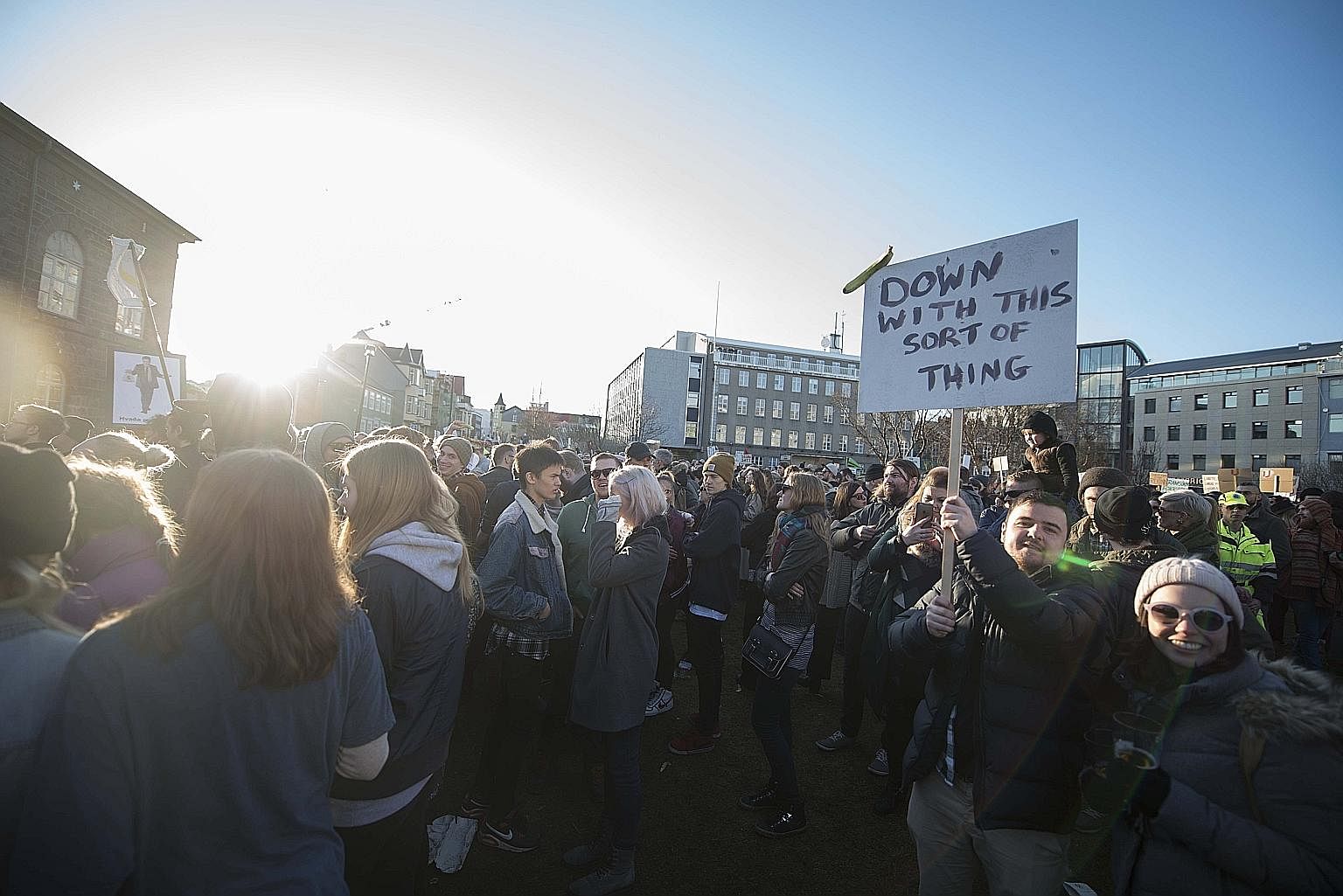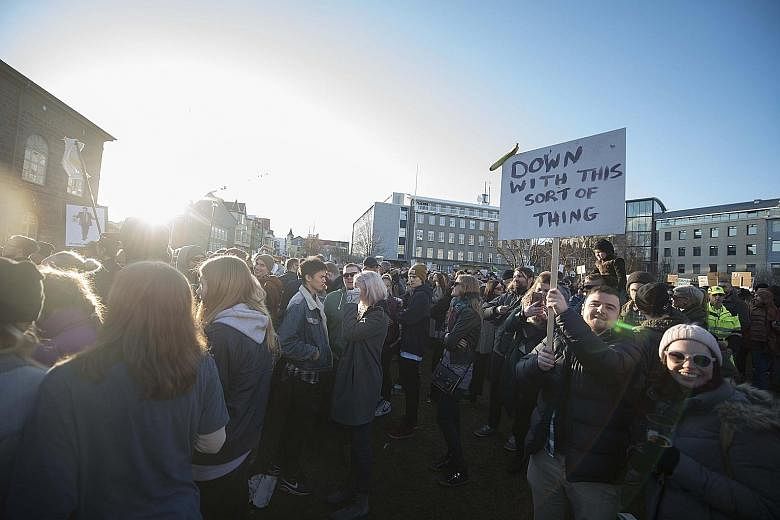With the Panama Papers expose, perhaps we can now say the fortress walls of offshore secrecy are finally cracking. Such havens allow corruption and tax avoidance to take place on a massive global scale by some of the richest and most powerful people on earth. Meanwhile, the poor get poorer.
Western politicians have huffed and puffed about clamping down on offshore havens but in reality their collective breath would not have knocked over a little piggy's straw house, let alone bastions of vested interest. It is thanks to investigative reporters, whistle-blowers and unprecedented international media collaboration that the matter is being forced.
The advocacy group Global Financial Integrity reports that illegal channelling of profits offshore cost developing countries nearly US$6 trillion (S$8 trillion) between 2001 and 2010. As Facebook posters like to remind us, 1 per cent of the world's population owns half the wealth and they like to hoard it.
But finally things may be changing. We are being treated to the third major offshore data leak in as many years. The first was the Cayman Islands tax leak in 2013 that exposed a huge number of major figures worldwide as holding accounts in the tiny island - a British dependency - in secrecy.
Then there was the great HSBC leak, which revealed that the company's Swiss private bank had helped wealthy account holders from other nations dodge huge sums of due tax. Now it is the turn of Panama - an excellent place to park large sums of money.
The Panama probe has again featured a global network of like-minded journalists. Among the organisations involved are The Guardian and the BBC, which have a longstanding relationship with the International Consortium of Investigative Journalists (ICIJ), which is at the heart of this operation. The material is said to have been leaked to the German newspaper Suddeutsche Zeitung from the database of Mossack Fonseca, the world's fourth- biggest offshore law firm.

It must be dawning on the rich and powerful that their privacy is no longer guaranteed. The opening reports of the Panama Papers focus on a US$2 billion trail to Russian President Vladimir Putin. But we can expect revelations about many more people to come.
SECRET BANKING PARADISE
For those wanting to establish a really secret tax avoidance scheme, it is not good enough just to pick one offshore tax haven - say the British Virgin Islands (BVI) or the Caymans. You need a series of interlocking offshore accounts in different jurisdictions to guarantee anonymity. BVI is good for setting up companies and the Caymans offers very discreet bank accounts. Meanwhile, Panama is tax-exempt and stonewalls requests for company information from investigators elsewhere.
Offshore firms incorporated in Panama - and their owners - are exempt from all forms of taxes - corporate, withholding, income, capital gains, local and estate or inheritance, including on gifts.
Panama has more than 350,000 secretive international business companies registered: the third- largest number in the world, after Hong Kong and the BVI.
Also, Panamanian financial services are proactive in forming tax-avoiding foundations and trusts. Violation of financial secrecy is punishable by imprisonment.
Panama ranks 14th on the 2015 Financial Secrecy Index. But it remains a jurisdiction of particular concern. The Organisation for Economic Cooperation and Development's Mr Pascal Saint Amans summed up the problem recently: "From the standpoint of reputation, Panama is still the only place where people still believe they can hide their money."
The Tax Justice Network (TJN) says: "Until now Panama has been fairly indifferent to reputational issues, but the increased attention... will inevitably raise concerns among the punters that (it) is no longer able to protect the identity of the crooks and scammers attracted by its dodgy laws and equally dodgy law firms."
TJN says Panama has long been the recipient of drug money from Latin America, plus ample other sources of dirty money from the US and elsewhere - it is one of the oldest and best-known tax havens in the Americas. In recent years, it has adopted a hard-line position as a jurisdiction that refuses to cooperate with international transparency initiatives.
In Jeffrey Robinson's 2003 examination of tax havens: The Sink: Terror, Crime And Dirty Money In The Offshore World, a US Customs official is quoted as saying: "The country is filled with dishonest lawyers, dishonest bankers, dishonest company formation agents and dishonest companies registered there by those dishonest lawyers so that they can deposit dirty money into their dishonest banks. The free trade zone is the black hole through which Panama has become one of the filthiest money-laundering sinks in the world."
THE INVESTIGATORS AND PAST OPERATIONS
The emergence of a global network of journalists prepared to take on these secret havens has at its heart the award-winning investigative journalist Gerard Ryle, who spent 26 years working as a reporter and editor in Australia and Ireland. While working at the Sydney Morning Herald, Mr Ryle was told by a source that he would get a significant package which could be the biggest story of his career.
The package - with a hard drive inside - duly arrived, and at first, Mr Ryle did not know what it all meant. But it became clear that it was an enormous cache of details of confidential e-mails, documents and files from the offshore world. Ryle knew it was information from the secretive offshore world, was authentic and that the next step was to organise extracting the data in some kind of meaningful format. A chance to have access to the resources needed for this type of operation became available when he was offered a job heading the ICIJ in Washington, DC.
The ICIJ said 86 journalists from 46 countries used both high-tech data crunching and traditional reporting to sift through e-mails and ledgers covering 30 years. One of the biggest hits for the ICIJ was on Azerbaijan's President Ilham Aliyev, after he and his family were revealed as shareholders in at least four offshore firms. It is against Azerbaijani law to be involved in business while in power. By September 2013, journalists had produced stories from the database about prominent citizens who had hidden offshore accounts.
Then in February last year, a team of journalists from 45 countries opened to public scrutiny secret bank accounts maintained for criminals, traffickers, tax dodgers, politicians and celebrities. Data revealed that HSBC profited from doing business with arms dealers, the ICIJ reported. The leaked files related to accounts holding more than US$100 billion. The documents showed HSBC's private banking arm had dealt with clients engaged in illegal behaviour.
After being informed of the full extent of the findings, HSBC told ICIJ: "We acknowledge that the compliance culture and standards of due diligence in HSBC's Swiss private bank, as well as the industry in general, were significantly lower than they are today."
Later that year, ICIJ was given access to the largest data haul so far - some 11 million documents covering accounts held by the rich across the globe. The follow-up stories are now breaking and will fill news bulletins for a while yet. It is proof of the need for investigative journalists to hold the powerful to account.
• The writer is a senior lecturer in journalism at the University of Sussex in the United Kingdom.
• This is excerpted from an article on theconversation.com, a website of analyses from academics and researchers.

